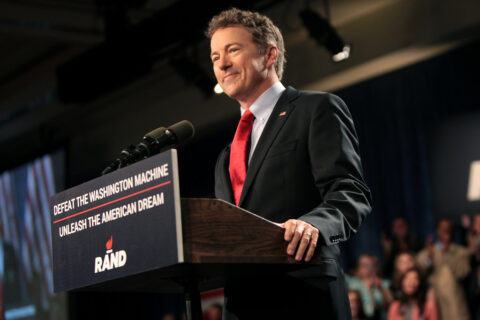Patrick Carroll selects some of the least-defendable ways the US government has been spending taxpayer money from Senator Rand Paul’s 2024 Festivus Report, including pickleball courts, $10B in unused office space, DEI initiatives for birdwatchers, crop fertilizer in foreign countries, and literal circus performances:

Rand Paul by Gage Skidmore is licensed under CC BY-SA 2.0 .
Why does such government waste persist year after year? A significant part of the explanation traces back to the concept of concentrated benefits and dispersed costs. Essentially, the beneficiaries tend to be a small, concentrated group, so they lobby hard for these outlays because they stand to gain a lot from them. Taxpayers, on the other hand, tend to be dispersed and only minimally affected by any single expense, so it’s not usually worth it for them to lobby against the spending, or even learn about it in the first place.
Economist Gordon Tullock famously illustrated this concept with his fictional Tullock Economic Development Plan. The plan “involves placing a dollar of additional tax on each income tax form in the United States and paying the resulting funds to Tullock, whose economy would develop rapidly”.
Think about the incentive Tullock would have to advocate for this plan, compared to the incentive that an ordinary taxpayer would have to look into it and voice their objections. With campaign contributions and votes to be gained from the special interest beneficiaries, is it any wonder politicians often go for these kinds of wealth transfers?
The ubiquity and stubborn persistence — year after year — of all this waste, combined with the economic theory that explains why it happens, suggests that there is a fundamental problem with the process of government as we know it. This is not, as many are itching to believe, a “Democrat” problem or a “Republican” problem. The degree of government waste changes very little with changing administrations. No, this is a problem with the government as such.
To solve this problem, we need to ask not just who should run the government, but what the government should be allowed to spend money on in the first place, given what we know about its entirely predictable and repeatedly demonstrated propensity for waste and dysfunction.
Milei has already started that conversation in Argentina. Let’s hope that with the new Trump administration and DOGE, that’s a conversation we can have here as well.




Canada suffers from the same ideology with respect to Grant Money. I, for one, would eliminate all forms of grants from every government department. If you hand out “free” money there will always be a line-up with their hands out.
And there is an entire industry of “Grant writers” out there helping the grafters get their “free money”. The “free money” adds up to billions of dollars in government spending, with virtually no oversight on this waste.
Every special interest group out there feels it deserves government money, and maybe the odd one does, but it is better to turn off all of the taps than sort through and find the occasional deserving person. And for those who support this garbage, let them use their own money to do so, and stop taking everyone else’s money to make themselves out to be the hero.
Comment by Dwayne — January 2, 2025 @ 12:45
You’re 100% correct here, and one of the danger signs I saw about 20 years ago was the vast increase in the number of technical writing jobs being posted, described as “grant writer” or “grant application writer”. Think about this for a second … the value of grants being given has become big enough that soi-disant “charities” can pay a full-time employee whose primary responsibility is to apply for grants. According to the Canadian government website, there were over 86 thousand federally registered charities in 2018 — I imagine there are many more now, and that’s only the ones listed by the feds. Each province probably has a similar registry and possibly municipalities too. Further down that page (https://www.canada.ca/en/revenue-agency/services/charities-giving/charities-media-kit/charities-program-facts-figures.html) it shows just how seriously the feds take the possibility of charities mis-using their funds: 548 federal charities were audited that year and 5 were penalized or suspended.
Comment by Nicholas — January 2, 2025 @ 13:35